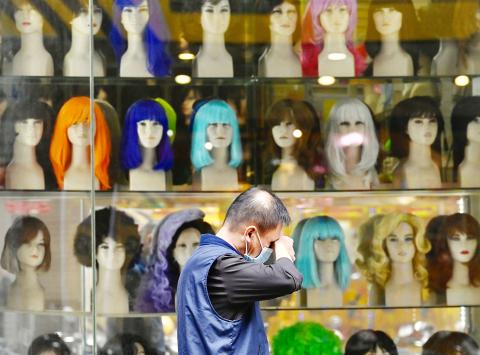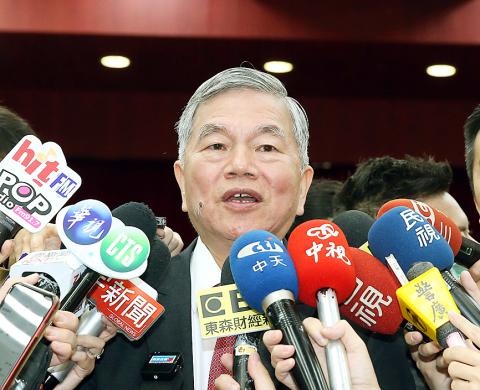A government plan to issue travel-based “stimulus coupons” to mitigate the effects of the COVID-19 outbreak could benefit up to 350,000 local businesses, Minister of Economic Affairs Shen Jong-chin (沈榮津) said yesterday.
Shen introduced the scheme at the Legislative Yuan as part of a NT$2 billion (US$66.6 million) stimulus plan from the Executive Yuan’s NT$60 billion special budget bill.
The Cabinet on Thursday last week approved the bill to finance strategies to combat the spread of COVID-19, which has infected 42 people in Taiwan, with one death, and help local industrial and commercial sectors hit hardest by the outbreak.

Photo: Sam Yeh, AFP
In the initial stage, about NT$600 to NT$800 worth of stimulus coupons would be issued in both paper and electronic forms, Shen said.
More than 140,000 restaurants and diners, 280,000 businesses in shopping centers, 10,000 night market vendors, and 1,700 arts and culture venues are expected to accept the coupons, he said, citing data from the Ministry of Economic Affairs.
After adjusting for double counting, the coupons could be used at about 350,000 businesses once they are issued, Shen said.

Photo: CNA
Under the ministry’s plan, the coupons would be tied to domestic travel, and issued in four categories: food and drink, night markets, shopping centers, and arts and culture.
However, it has not decided how to distribute the coupons, whether they should only be given to Taiwanese or also to foreign travelers, or how they would be used, it said.
Asked if the coupons would be issued prior to the Tomb Sweeping Day holiday from April 2 to April 5 to boost consumption during the spring break, as some people have suggested, Shen said that it was unlikely.
He said that the coupons would likely be issued between six and 12 months after the spread of COVID-19 slows down, to help hard-hit small and medium-sized businesses.
“With the outbreak still continuing, we should concentrate on outbreak prevention and control,” Shen said.
The ministry also plans to use more than NT$20.4 billion in the special budget bill to provide subsidies and loans to businesses most affected by the outbreak and to boost domestic demand, which is flagging due to the drop in the number of foreign visitors.
The budget would also be used to build new mask production lines, buy masks from local manufacturers and help export them overseas when that becomes possible.
The Legislative Yuan is reviewing the special budget.

South Korea’s equity benchmark yesterday crossed a new milestone just a month after surpassing the once-unthinkable 5,000 mark as surging global memory demand powers the country’s biggest chipmakers. The KOSPI advanced as much as 2.6 percent to a record 6,123, with Samsung Electronics Co and SK Hynix Inc each gaining more than 2 percent. With the benchmark now up 45 percent this year, South Korea’s stock market capitalization has also moved past France’s, following last month’s overtaking of Germany’s. Long overlooked by foreign funds, despite being undervalued, South Korean stocks have now emerged as clear winners in the global market. The so-called “artificial intelligence

‘SEISMIC SHIFT’: The researcher forecast there would be about 1.1 billion mobile shipments this year, down from 1.26 billion the prior year and erasing years of gains The global smartphone market is expected to contract 12.9 percent this year due to the unprecedented memorychip shortage, marking “a crisis like no other,” researcher International Data Corp (IDC) said. The new forecast, a dramatic revision down from earlier estimates, gives the latest accounting of the ongoing memory crunch that is affecting every corner of the electronics industry. The demand for advanced memory to power artificial intelligence (AI) tasks has drained global supply until well into next year and jeopardizes the business model of many smartphone makers. IDC forecast about 1.1 billion mobile shipments this year, down from 1.26 billion the prior

People stand in a Pokemon store in Tokyo on Thursday. One of the world highest-grossing franchises is celebrated its 30th anniversary yesterday.

NEW IDENTITY: Known for its software, India has expanded into hardware, with its semiconductor industry growing from US$38bn in 2023 to US$45bn to US$50bn India on Saturday inaugurated its first semiconductor assembly and test facility, a milestone in the government’s push to reduce dependence on foreign chipmakers and stake a claim in a sector dominated by China. Indian Prime Minister Narendra Modi opened US firm Micron Technology Inc’s semiconductor assembly, test and packaging unit in his home state of Gujarat, hailing the “dawn of a new era” for India’s technology ambitions. “When young Indians look back in the future, they will see this decade as the turning point in our tech future,” Modi told the event, which was broadcast on his YouTube channel. The plant would convert